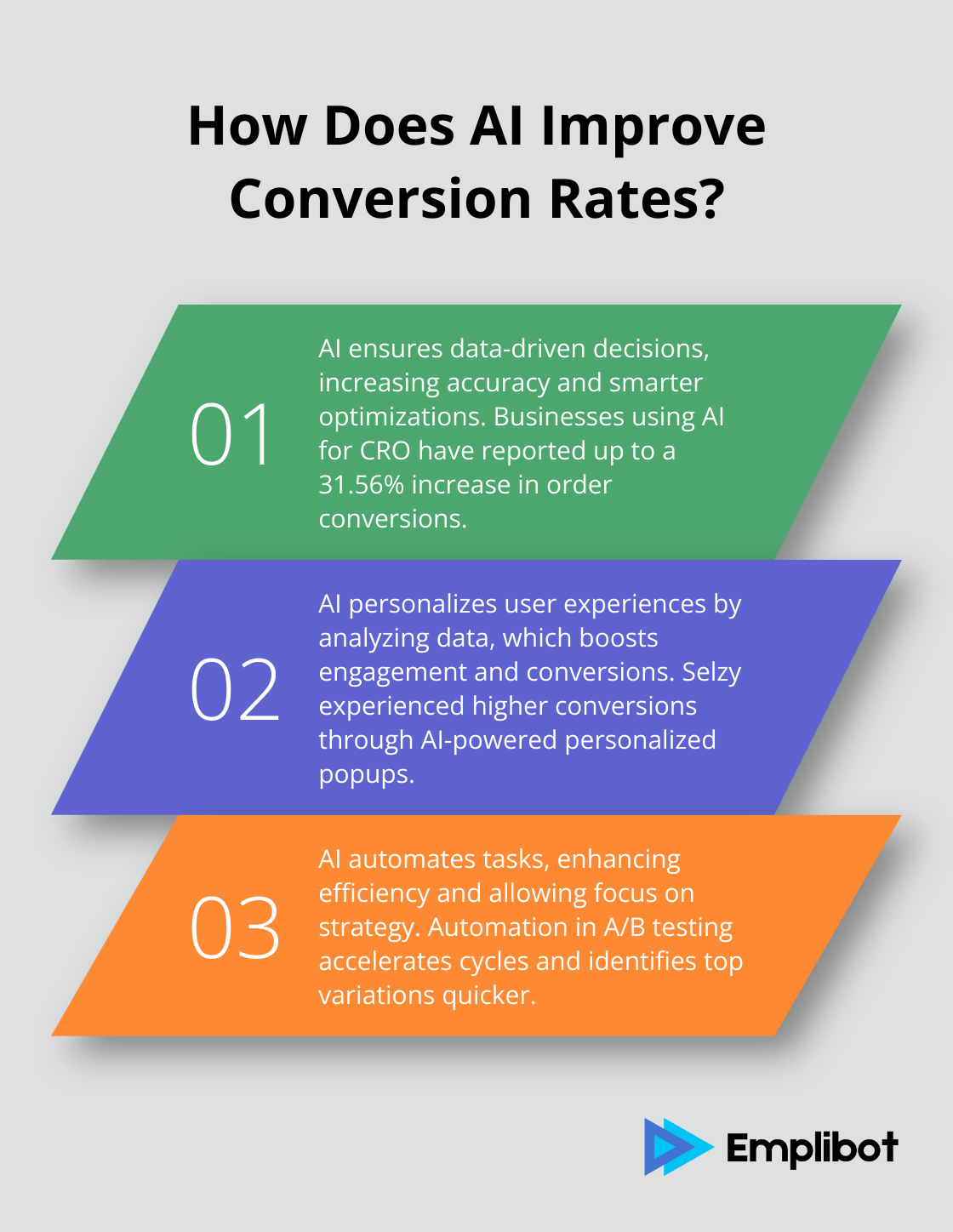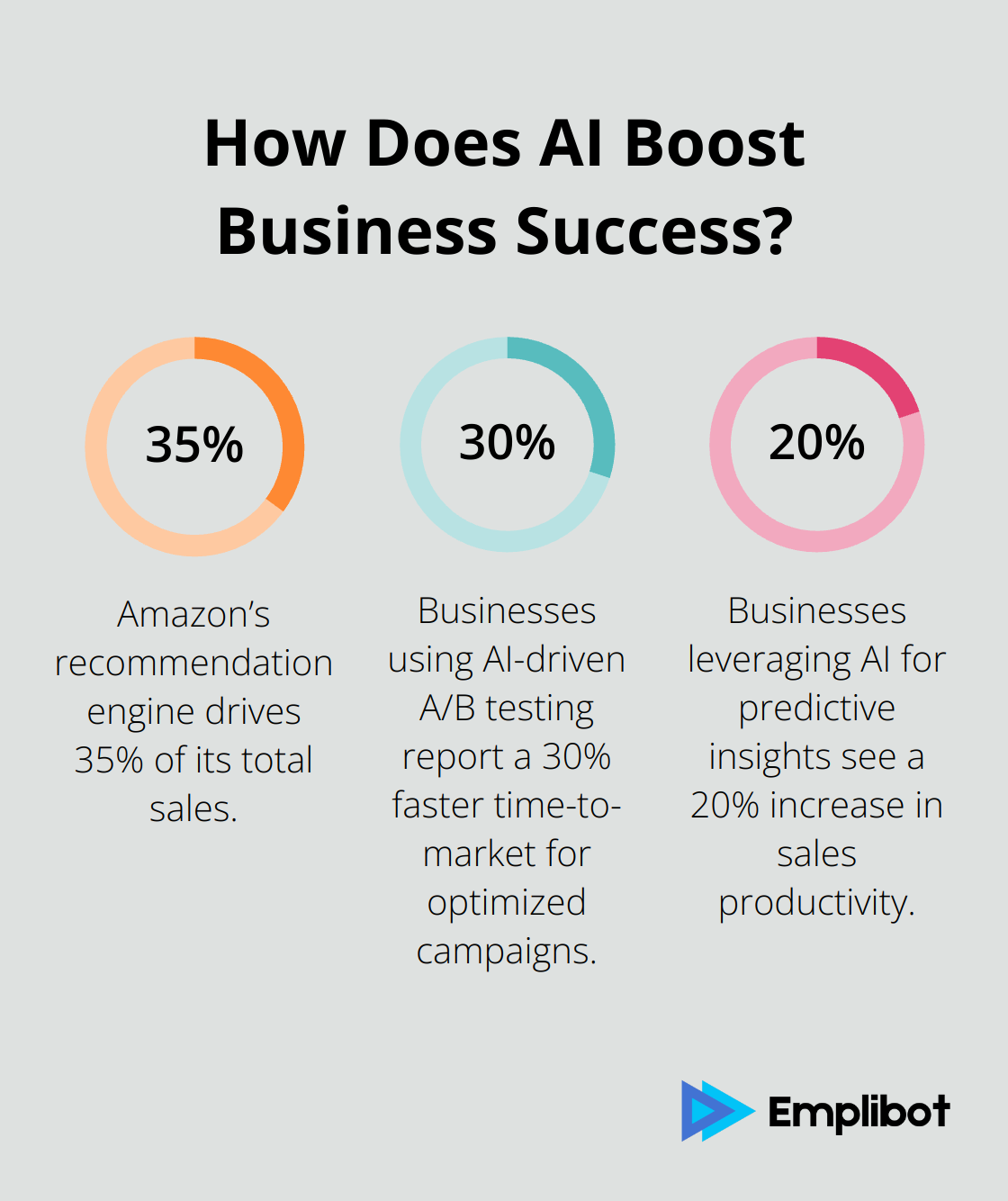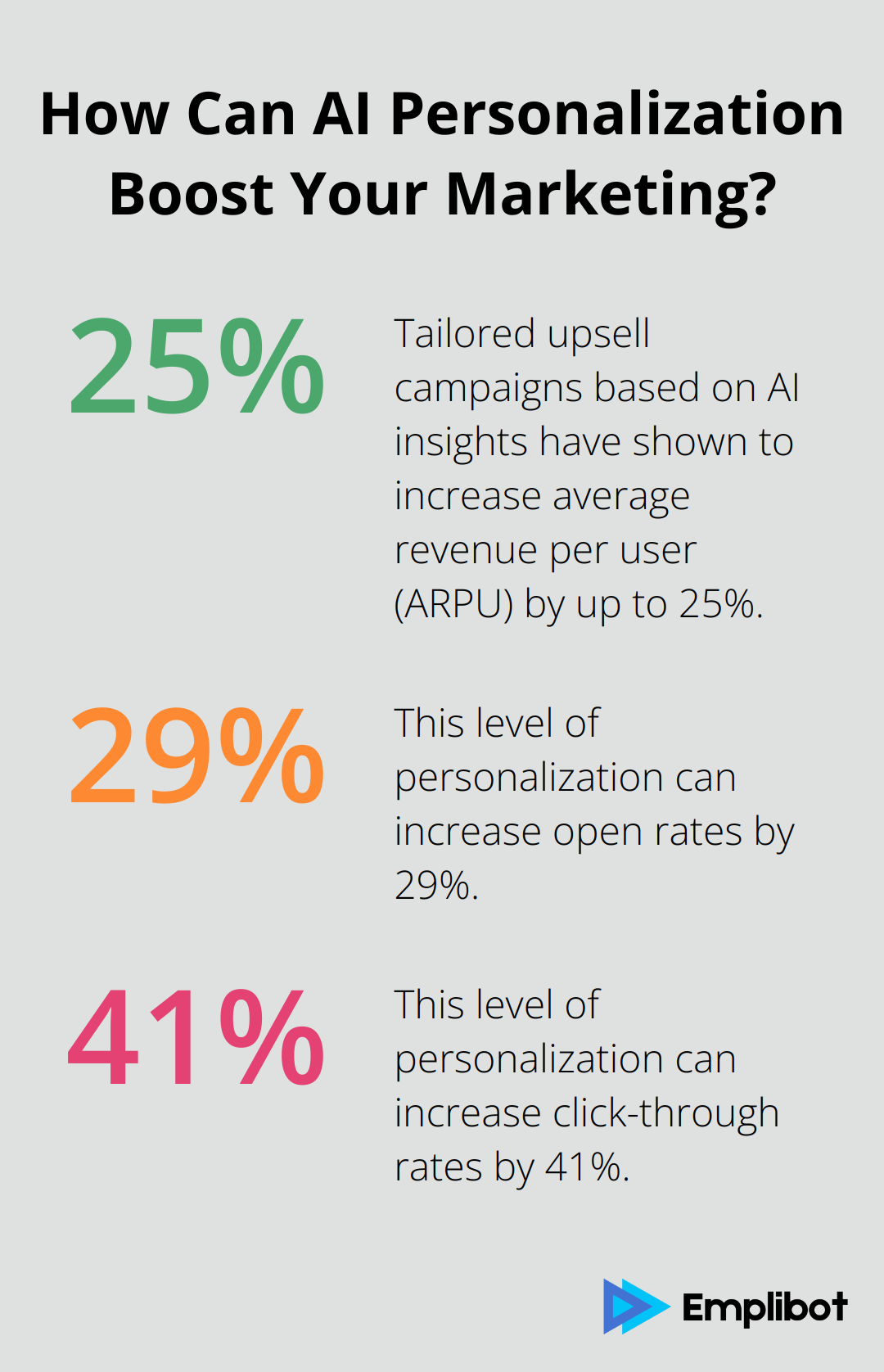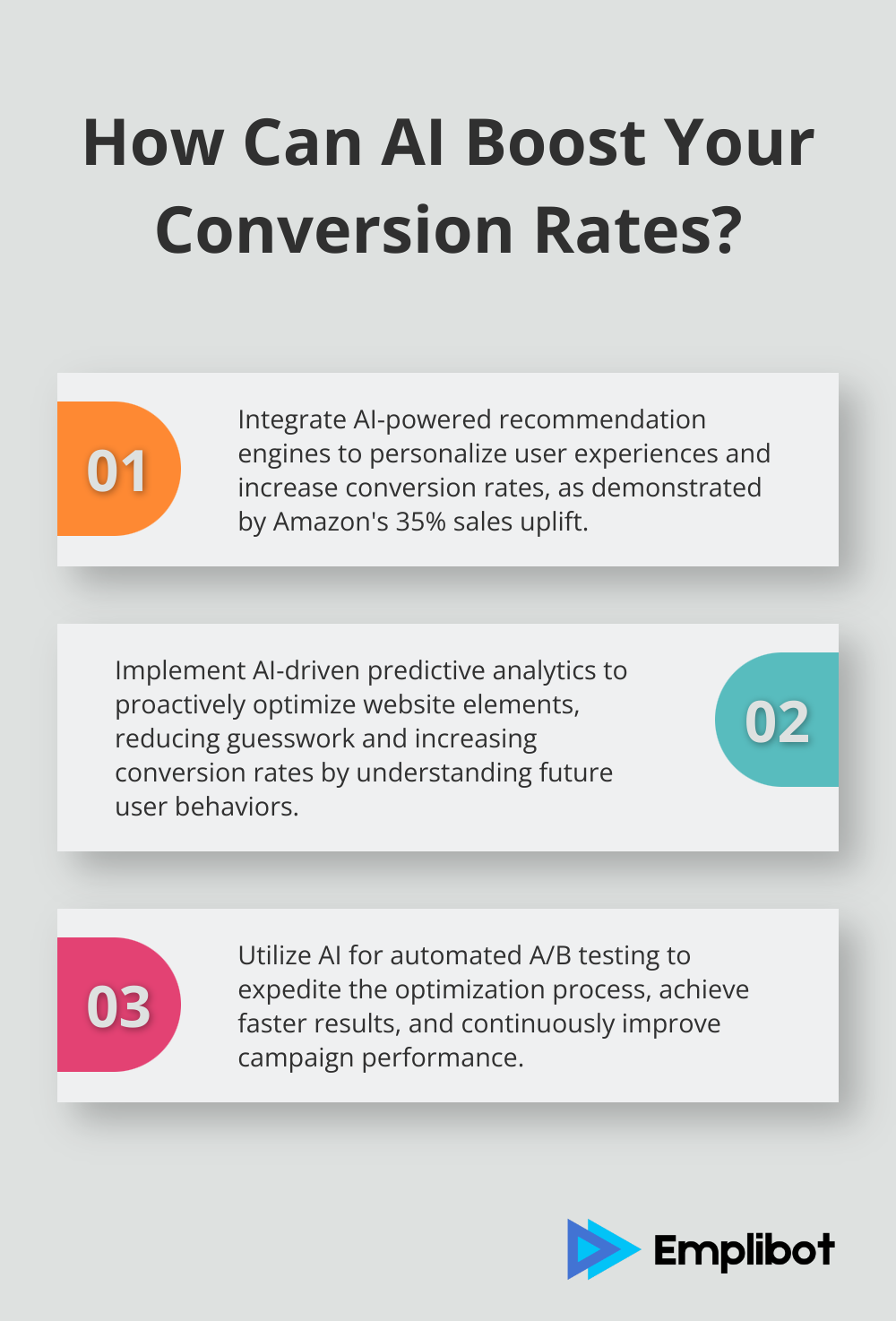Boosting conversion rates is vital for businesses aiming to maximize their online impact.
Artificial intelligence is revolutionizing how companies like ours tackle conversion rate optimization.
We explore effective AI-based strategies, from personalization to predictive analytics, that drive meaningful results.
Real-world case studies show the transformative potential of AI in customer engagement, user retention, and lead generation.
Contents
ToggleHow Does AI Improve CRO?
Understanding conversion rate optimization (CRO) is crucial for any business operating online. CRO focuses on increasing the percentage of visitors who complete desired actions on a website, like making purchases or filling out forms. Effective CRO means higher sales, greater customer engagement, and better returns on marketing investments.
What is Conversion Rate Optimization (CRO)?
At its core, CRO involves analyzing user behavior and applying changes to improve the likelihood that visitors will convert. It’s about maximizing the value of the traffic you already have rather than focusing on attracting more visitors. This includes tweaking landing pages, simplifying forms, and making navigations more intuitive to guide users towards conversion points efficiently.
How AI Enhances Traditional CRO Methods
Artificial intelligence changes the game for CRO by leveraging vast amounts of data to generate insights and make predictive adjustments. Traditional CRO might rely on manual tweaks and A/B testing, which can be time-consuming and limited by human capacity. In contrast, AI examines patterns, predicts outcomes, and makes continuous adjustments at scale.

AI-driven tools can analyze thousands of data points in real time—from user interactions to session durations. For example, tools like Evolv AI have been proven to accelerate the testing process, helping companies achieve quicker wins. This speed and precision enable marketers to make informed decisions backed by robust data analysis.
The first step toward leveraging AI for conversion rate optimization (CRO) is ensuring it meshes well with your current marketing stack. This integration allows AI solutions to analyze a vast array of data efficiently and provide actionable insights.
Key Benefits of Using AI in CRO
Incorporating AI into CRO efforts yields significant advantages. Firstly, AI ensures all decisions are data-driven, eliminating guesswork. This leads to smarter optimizations and higher accuracy. In fact, businesses leveraging AI for CRO have reported up to a 31.56% increase in order conversions, as seen with Goldelucks.
Moreover, AI excels in personalization. It tailors user experiences by analyzing visitor data, increasing engagement, and ultimately conversions. Personalized experiences could range from content recommendations to dynamic pricing adjustments. For instance, Selzy saw a boost in conversions with AI-powered personalized popups.
AI also improves efficiency by automating repetitive tasks. This allows marketing teams to focus on strategic planning rather than operational details. Automation in A/B testing, for example, accelerates the cycle, providing faster results and helping identify top-performing variations without manual intervention.
For businesses aiming to optimize their marketing campaigns, integrating AI into CRO strategies isn’t just advantageous—it’s essential for staying competitive. By making data-driven decisions, personalizing user experiences, and streamlining processes, AI dramatically enhances conversion rates, paving the path to greater online success.
What are Effective Strategies for AI-Powered CRO?
Personalization and Behavioral Insights
Utilizing AI for personalization isn’t optional—it’s mandatory for maximizing conversion rates. AI examines behavioral data to tailor experiences for individual users. Studies show that personalized CTAs convert 202% better than generic ones. For example, Amazon’s recommendation engine, which relies on user behavior analysis, drives 35% of its total sales. By dynamically adjusting content and offers, AI ensures users see what they’re most likely to engage with, increasing the chances they will take action.
A/B Testing and AI Recommendation Engines
Traditional A/B testing can be tedious and slow. AI accelerates this process, offering more efficient ways to test hypotheses and validate decisions. AI recommendation engines analyze data in real-time to determine the best-performing variants. Evolv AI boosts efficiency by automatically identifying winning designs, allowing marketers to make rapid adjustments. Businesses using AI-driven A/B testing report a 30% faster time-to-market for optimized campaigns. This speed allows for continuous improvement far beyond manual methods.
Predictive Analytics for Future Conversions
Predictive analytics is the game-changer in CRO. AI doesn’t just react; it predicts future behaviors and outcomes by analyzing past and current data. McKinsey & Company highlights that businesses leveraging AI for predictive insights see a 20% increase in sales productivity. AI predicts which changes will lead to conversions, allowing businesses to optimize proactively. Integrating predictive analytics means knowing the actions to take next, reducing guesswork and significantly increasing conversion rates. The first step toward leveraging AI for conversion rate optimization (CRO) is ensuring it meshes well with your current marketing stack.

What Are The Key Success Stories?
E-commerce Platforms: Enhanced Sales and Customer Engagement
E-commerce platforms have seen tremendous benefits from integrating AI into their CRO strategies. For instance, utilizing AI for personalized product recommendations has proven highly effective. Amazon drives 35% of its sales through its recommendation engine, showcasing the power of AI in this sector. By analyzing user behaviors and preferences in real-time, AI tools suggest products that resonate with individual shoppers, increasing the likelihood of purchase.

Moreover, AI-powered chatbots offer instant customer support, significantly enhancing user engagement and satisfaction. These chatbots answer questions, assist with orders, and even provide personalized product recommendations based on browsing history. This automation not only improves user experience but also reduces the burden on customer service teams, allowing them to focus on more complex issues.
SaaS Companies: Boosted User Retention and Upsell
Software as a Service (SaaS) companies are leveraging AI to increase user retention and upsell opportunities. By analyzing user behavior, AI helps identify signs of churn early. This allows SaaS companies to intervene with targeted campaigns, such as personalized emails or in-app notifications, designed to re-engage users and address potential issues before they lead to cancellations.
Furthermore, AI can pinpoint upsell opportunities by understanding user needs and usage patterns. For example, Slack uses AI to recommend additional features or higher-tier plans to customers who frequently hit usage limits or show interest in particular functionalities. Tailored upsell campaigns based on AI insights have shown to increase average revenue per user (ARPU) by up to 25%.
B2B Services: Strengthened Lead Generation and Conversion Rates
Businesses in the B2B sector gain a competitive edge by employing AI for lead generation and conversion rate optimization. AI tools can parse through enormous data sets to identify high-value leads with greater accuracy. These tools analyze various parameters, such as job titles, company size, and engagement levels, to prioritize leads most likely to convert.
AI-driven email marketing campaigns further enhance these efforts by customizing messages for each recipient based on their interaction history and pain points. This level of personalization can increase open rates by 29% and click-through rates by 41%, culminating in more successful lead conversions.
In addition, predictive analytics assist sales teams in understanding which prospects are most likely to convert and when. By focusing efforts on these high-potential leads, sales cycles shorten, and conversion rates improve. For instance, Salesforce reported a 20% increase in sales efficiency after incorporating AI-driven predictive insights into their CRM system.
Through these case studies, it’s evident that AI-powered CRO offers substantial benefits across different industries, leading to enhanced sales, greater user engagement, and improved conversion rates.
Conclusion
AI-powered conversion rate optimization offers undeniable benefits, making it a powerful tool for businesses striving to maximize their online impact. By integrating AI, companies can leverage data-driven insights to improve conversion rates, personalize user experiences, and automate repetitive tasks. These strategies lead to significant enhancements in customer engagement, user retention, and ultimately, sales.

Real-world examples highlight the transformative potential of AI across various sectors. E-commerce giants like Amazon achieve impressive sales boosts through personalized recommendations, while SaaS companies like Slack improve user retention and upselling by understanding customer needs. B2B services, too, benefit from AI’s precision in lead generation and email marketing, driving higher conversion rates and sales efficiency.
The progress AI has made in CRO demonstrates its capacity for future growth. Businesses that adopt AI-driven CRO are not just staying competitive—they’re setting new industry standards. As technology advances, the strategies and tools available will only become more sophisticated, offering even greater opportunities for businesses to enhance their marketing efforts.
For those looking to simplify their content marketing, Emplibot provides an invaluable service. Emplibot publishes SEO-friendly articles to WordPress sites automatically, taking care of keyword research, images, and internal linking. This allows businesses to build their blogs efficiently, freeing up time to focus on AI-powered CRO and other strategic priorities.
Embrace AI-powered CRO practices to unlock higher efficiency, better engagement, and improved conversion rates, paving the way for sustained online success.










 Rated Excellent 4.5
Rated Excellent 4.5